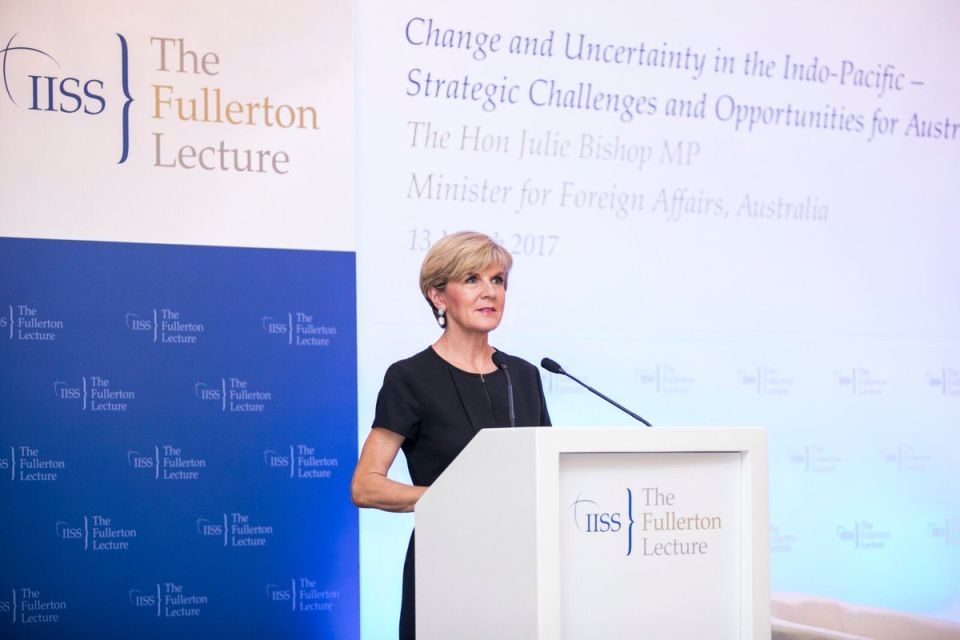Interesting piece by Brisbane based geopolitical analyst and Barrister at Law James O’Neill*
The Australian government’s selective view of history and capacity for self-delusion in its foreign policy was on full display when Foreign Minister Julie Bishop delivered the Fullerton Lecture to the International Institute of Strategic Studies in Singapore on Monday 13 March 2017.
She called on the United States to “play an even greater role as the indispensable strategic power in the Indo-Pacific.” “It” (the US) “is the pre-eminent global strategic power in Asia and the world by some margin,“ she said. The region was in what she called a “strategic holding pattern and waiting to see whether the US and its security allies and partners can continue to play the robust and constructive role they have for many decades in preserving the peace.”
Ms Bishop is being reported (SMH 14.3.17; ABC 14.3.17) as sending a “clear message to China” saying that “domestic democratic habits of negotiating and compromise are essential to powerful countries resolving their disagreements according to international law and rules.”
One seriously questions what parallel universe Ms Bishop and her government are occupying.
According to research carried out by William Blum (www.antiempirereport.com 17 March 2017) since the end of World War 2 the United States has:
– Attempted to overthrow more than 50 foreign governments, most of them democratically elected.
– Dropped bombs on more than 30 countries.
– Attempted to assassinate more than 50 foreign leaders.
– Attempted to suppress a populist or nationalist movement in more than 20 countries.
– Grossly interfered in democratic elections in more than 30 countries.
Just to take some examples closer to home, the United States overthrew the Indonesian government of President Sukarno in 1966, with the active assistance of the British (Independent UK 1.12.98). The CIA supplied to the Suharto dictatorship that followed the names of more than half a million (largely ethnic Chinese) citizens who were then murdered.
One of the little appreciated facts of history is that the US ambassador in Indonesia at the time went on to be the ambassador in Chile shortly before the overthrow of the Allende government, and then to Canberra shortly before the overthrow of the Whitlam government. Opposing US foreign policy can be dangerous, even for supposed friends and allies.
Following the 1954 Geneva Accords that terminated the French occupation of Indo-China, Vietnam was divided into two parts. The US refused to allow the southern part to hold free elections in accordance with the Geneva Accords. The most likely reason is that they thought that Ho Chi Minh would win.
That gross interference triggered what we are pleased to call the Vietnam War, but what the Vietnamese more accurately call the American War.
Millions of Vietnamese were killed or wounded in that war, which did not end until 1975 with the ignominious flight of the Americans. There was huge environmental damage through the widespread use of the carcinogenic Agent Orange among other forms of chemical warfare.
Vietnam’s neighbours, Cambodia and Laos, suffered massive bombing from the US. Ordinance from that era is still killing and maiming Cambodians and Laotians. Perhaps needless to add, the war against Laos and Cambodia was undeclared. It was labeled the “secret war” although hardly a secret to the victims.
Further afield but still involving Australians, Iraq was invaded in 2003 on multiple false pretexts and contrary to international law. Unlike the British and the Dutch, Australia has refused to conduct a Chilcot style inquiry.
The disastrous consequences of that invasion are an ongoing problem, with the rise of Islamic extremism only one of the results. The new Trump administration seems determined to repeat the disaster with Trump and other senior administration officials making open threats against Iran.
The Iraqi experience did not deter either the US or Australia from attacking Syria, another breach of international law. The Australian government lied about that decision, and refused to release the legal advice upon which it was purportedly made.
The most likely real reasons for Australia’s willing participation in other people’s illegal wars and other ongoing disastrous foreign misadventures were disclosed in the recently released Palazzo Report. (J. O’Neill www.johnmenadue.com 1st March 2017). Palazzo makes clear that the dominant foreign policy consideration is to curry favour with the Americans by paying what might fairly be regarded as insurance premiums against some hypothetical future need.
Quite how this sorry record (and it is only a fraction of the full horror) makes the United States the “indispensable strategic power”, or reflects “a constructive role in maintaining the peace”, or even “resolving disagreements according to international law and rules” is frankly baffling.
China might not meet Ms Bishop’s standard of ‘democracy’, but its role in such massive and peaceful developments as the One Belt, One Road projects; the Regional Comprehensive Economic Partnership and the Shanghai Cooperation Organisation makes it more truly the ‘indispensable power’ than Ms Bishop’s American centred fantasies.
The time has long since arrived when Australia’s foreign policy reflected the world we actually inhabit and Australia’s national security interests within that real world.
Building a foreign policy on the basis of a world that never was is infinitely more dangerous and not in Australia’s national interest.
*Barrister at Law and geopolitical analyst. He may be contacted at joneill@qldbar.asn.au


